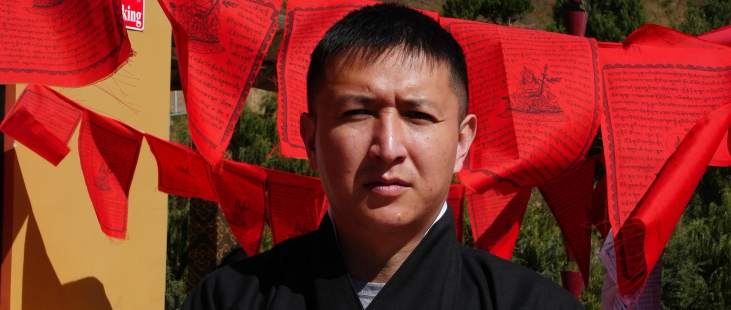When Rikesh Gurung traveled from Bhutan to India for school in 2003, he expected to return home with an education – and he came back with much more.
Gurung was in Chennai, India, when the city’s first recycled waste plastic road was laid, and Jambulingam Street’s unique materials caught his attention. When he returned to Bhutan seven years later, Gurung brought with him an idea for the country’s first-ever recycling initiative: The Green Road.
The Green Road repurposes waste plastic into building materials. Since the launch of his business in 2014, Gurung and his team have laid 140 km of plastic-based roads and averted more than 750 tonnes of plastic from Bhutan’s landfills.
Gurung’s roads come equipped with a seven-year warranty, but he says that’s hardly necessary: the material has held up impeccably – unlike Bhutan’s regular asphalt roads, one-fifth of which require annual maintenance – offering a promising and sustainable future for the country’s paving industry.
In 2021, Gurung and his company placed among the top 100 in the Entrepreneurship World Cup (EWC), a competition that started with 100,000 applications from 200 countries. Since then, Gurung’s entrepreneurial spirit has led him to launch two other businesses and mentor budding Bhutanese entrepreneurs.
Gurung is the recipient of Bhutan’s first-ever Best Loden Mentor award, a United Nations Environment Programme award, and, on top of a host of other achievements, was recognized by the Queen and King of Bhutan for his eco-conscious initiatives.
GEN caught up with Gurung to see how The Green Road continues to pave the way to a sustainable future.
*This interview has been edited for length and readability.
GEN: Why is environmental sustainability important to you?
Rikesh Gurung: In Bhutan, our focus is always on the environment: it is one of the four pillars of Bhutan’s Gross National Happiness philosophy and a crucial ingredient in the development of our country. Bhutan’s constitution mandates that we maintain at least 60 per cent of our forest cover, and we were the first carbon-negative country in the world.
Sustainability must be at the heart of any project. That is the principle of being Bhutanese.
GEN: What is it like growing a business in Bhutan?
Rikesh Gurung: I was told a few days back that if you’re able to do business in Bhutan, you can do business anywhere. I agree with that – in a country with such a small population, it’s difficult to capture the market and convince people of new business ideas, especially with sustainability as a priority. We also don’t have much advanced technology because Bhutan is still developing, so growing a business is challenging – but I like challenges.
Since The Green Road is environmentally conscious, I received support from the government, the community, and my family. We started very small in 2014, and four years later, the company was re-inaugurated by the Queen of Bhutan, patron of the environment. It’s been overwhelming.
GEN: You were successful in the 2021 Entrepreneurship World Cup. What impact did EWC have on you and your business?
Rikesh Gurung: The Entrepreneurship World Cup was the first of its kind for me. I came in the top 100 out of more than 100,000 applicants, which was big – for me, for the company, and for Bhutan as a whole. A lot has changed since then: if 10 people knew about me before EWC, at least 100 people know about me now.
EWC gave me the platform to dream big and the confidence to go above and beyond. I’m very glad I took part in this competition.
We still have a groupchat with mentors from the competition, where they continue to guide us and share opportunities. They send invitations for programs happening in, say, Miami, so we can take part in competitions and learn about grants available. Most of the entrepreneurs in that group have taken advantage of the opportunities and have been very successful in receiving funding.
GEN: Why did you decide to participate in EWC?
Rikesh Gurung: While my motivations for participating in EWC were personal, I am also the president of the Bhutan Association of Entrepreneurs, so it was important for me to lead the way. There are aspiring entrepreneurs following me who also want to do well on international platforms. EWC has allowed me to encourage them.
GEN: What’s next for yourself and The Green Road?
Rikesh Gurung: The Green Road is a full-fledged construction company now. It sustains itself, meaning I don’t have to be in the office every day. We have a full, dedicated team of 65 employees who do everything from collecting plastic waste from landfills to integrating the plastic into road construction.
The confidence I gained from EWC pushed me to create more businesses, and now I’m trying to go beyond – my goal is to create new job markets for young people, inspire them to focus on new initiatives and technology, and promote sustainability and security for Bhutan’s youth.
GEN: You pride yourself in mentorship. How are you inspiring Bhutan’s youth?
Rikesh Gurung: I have the privilege of visiting schools, and the first thing I ask the students is, “How many of you wish to be an entrepreneur?” Out of 400 students, we usually see two to three hands go up. They want a common job after they graduate, and if they don’t get that, they want a corporate job. And then, if they don’t get their first two choices, they’ll end up self-employed or start a business.
That mindset has to change. It is important for students to understand that being an entrepreneur is a great idea. It means you are providing solutions to societal problems, creating employment, and engaging in the economy. In 2021, we introduced entrepreneurship as a subject in place of commerce in schools from class 11 onwards. Children are now studying The Green Road.
GEN: What’s the most memorable moment of your entrepreneurial career so far?
Rikesh Gurung: I had never dreamed of meeting the Queen and King of Bhutan – it was beyond my wildest dreams. But in 2017, I got my first royal audience with His Majesty, whom I’ve met five times now. And the amazing thing is, the queen and king have not inaugurated any private company in Bhutan for the last 100 years, but they inaugurated my company. It’s a blessing for me and my entire team.
I also have an 8-year-old son who talks about environmental waste management and the plastic roads I’ve built, and about being the future CEO of the Green Road. Of course, he’s too young to understand what I do, but when he’s older and realizes his father built the first plastic road in Bhutan, I will be the proudest and happiest father in the world.
When I started my business, I imagined it would be all about fame and money, but the purpose of life is very different now. These are the things that actually give me happiness. Money will come and go, but I’ve dedicated myself to encouraging young entrepreneurs.
GEN: What advice would you give to young entrepreneurs?
Rikesh Gurung: I think the hardest thing about being an entrepreneur is having people say no to you constantly. When I first started presenting my business to [government] ministries, they would mock me, saying, “this guy comes from nowhere and wants to change how roads are made.” And that is everywhere. Any entrepreneur, any youth who wants to start a business, has to listen to that noise. It can come from family members, friends, prospective customers, financers, and enemies – they’ll all doubt.
So, being an entrepreneur is not just executing your business vision or raising funding. It’s coming back for more than you can possibly imagine and proving doubters wrong. Not everyone wants you to succeed, nor will everyone like you. I think once you come to terms with that, you can take your vision to another level.


